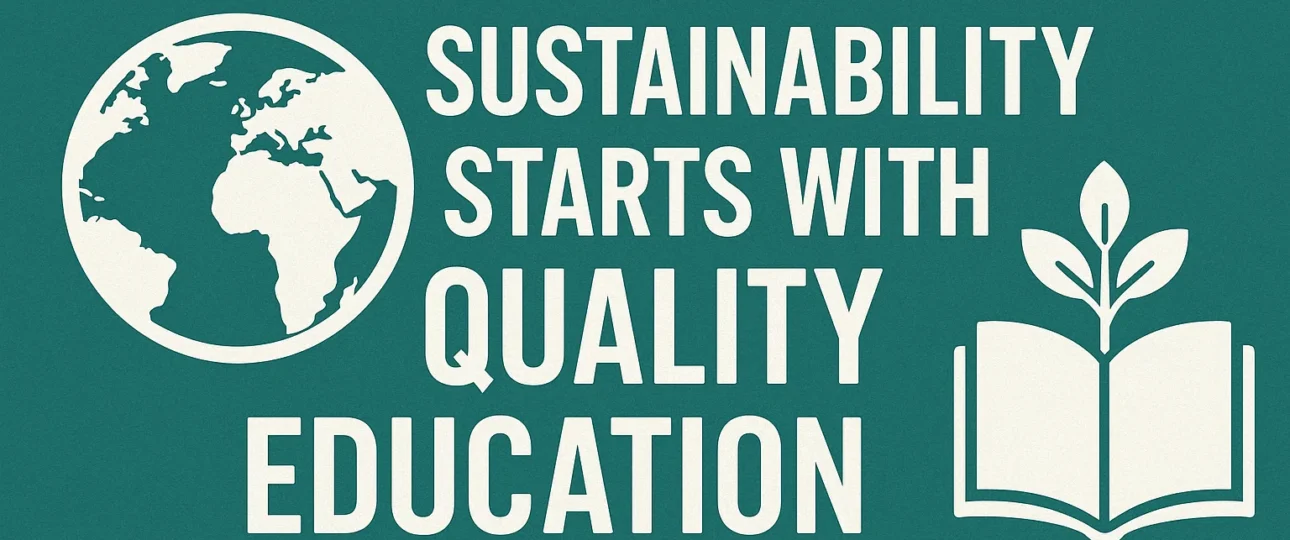Sustainability Starts With Quality Education: Building a Better Future
In today’s rapidly changing world, the quest for sustainability has become one of the most critical global challenges. Environmental degradation, climate change, social inequality, and economic instability threaten the well-being of current and future generations. To address these issues holistically, it is imperative to recognize that sustainability starts with quality education. Quality education empowers individuals and communities to understand, engage with, and act upon the complex factors driving sustainable development.
This article explores why sustainability and quality education are inseparable, how education shapes sustainable societies, and what steps can be taken to foster an educational environment that nurtures sustainability for all.
Understanding Sustainability: More Than Just Environment
Sustainability is often linked exclusively to environmental preservation, but it encompasses a broader concept. The United Nations defines sustainable development as “development that meets the needs of the present without compromising the ability of future generations to meet their own needs.” This definition highlights three pillars:
- Environmental Sustainability: Responsible management of natural resources and ecosystems.
- Economic Sustainability: Supporting economies that provide fair opportunities and prosperity without exploitation.
- Social Sustainability: Promoting equity, inclusion, human rights, and social cohesion.
All these pillars are interdependent. For societies to thrive sustainably, people must not only adopt environmentally friendly habits but also foster social justice and economic resilience. This is where education plays a vital role.
Why Sustainability Starts With Quality Education
Education is a powerful enabler and multiplier of sustainable development. The phrase sustainability starts with quality education reflects that only through informed, knowledgeable, and empowered individuals can sustainable changes be realized at scale. Here’s why:
1. Awareness and Understanding
Quality education raises awareness about the complex challenges facing the planet and society. It equips learners with critical thinking skills to analyze environmental, economic, and social issues objectively. When people understand the root causes of problems such as climate change, resource depletion, or poverty, they are more motivated to adopt sustainable behaviors and advocate for effective policies.
2. Skills for Sustainable Living and Innovation
Sustainability requires new skills and innovative solutions—from renewable energy technologies to circular economy practices and sustainable agriculture. Quality education provides learners with practical skills and scientific knowledge to develop, implement, and maintain these solutions. It encourages creativity, problem-solving, and collaboration, which are essential for addressing evolving sustainability challenges.
3. Empowerment for Social and Economic Inclusion
Education promotes equality by giving marginalized groups opportunities to improve their lives. When everyone has access to quality education, social disparities diminish, and communities become more resilient. Empowered individuals can participate actively in decision-making processes related to sustainability, ensuring that solutions are just and inclusive.
4. Shaping Values and Attitudes
Education influences values, ethics, and attitudes. Quality education nurtures a sense of responsibility, empathy, and respect for nature and others. It fosters global citizenship—an understanding that individual actions have worldwide impacts and a commitment to protect the planet for future generations.
Key Elements of Quality Education for Sustainability
For education to effectively support sustainable development, it must go beyond traditional classroom teaching and rote learning. Here are critical components of quality education that align with sustainability goals:
Curriculum Integration
Sustainability should be integrated across subjects rather than isolated as a single topic. Environmental science, social studies, economics, ethics, and technology can all incorporate sustainability concepts, making learning holistic and relevant.
Experiential and Active Learning
Students benefit from hands-on experiences like gardening projects, energy audits, or community clean-ups. Such activities build practical understanding and a personal connection to sustainability.
Critical Thinking and Systems Thinking
Learners should develop the ability to see the big picture and interconnections between systems—economic, environmental, social—and understand consequences of actions on multiple levels.
Inclusive and Equitable Access
Quality education must be accessible to all children and adults regardless of gender, income, ethnicity, or location. Closing educational gaps is essential for sustainability to be truly universal.
Teacher Training and Resources
Educators need ongoing training, materials, and institutional support to teach sustainability effectively. This includes understanding emerging issues like climate justice, biodiversity loss, and sustainable consumption.
The Global Education Agenda and Sustainability
International frameworks emphasize the link between education and sustainability:
- The United Nations Sustainable Development Goal 4 (SDG 4) calls for inclusive and equitable quality education and promotes lifelong learning opportunities for all. It explicitly recognizes education as foundational to achieving other SDGs, including climate action (SDG 13) and reduced inequalities (SDG 10).
- The UN Decade of Education for Sustainable Development (2005-2014) raised awareness of education’s role in fostering sustainable societies.
- Many countries are revising their national education policies to embed sustainability principles aligned with global agendas.
These commitments reinforce that sustainability starts with quality education as a strategic priority for governments, educators, and stakeholders worldwide.
Challenges in Linking Education to Sustainability
Despite its recognized importance, several challenges remain:
- Unequal access to quality education persists globally, especially in low-income and rural areas.
- Education systems are often slow to adapt curricula and teaching methods to evolving sustainability demands.
- Insufficient resources and teacher preparedness hamper the delivery of effective sustainability education.
- There is a risk of “greenwashing” or superficial inclusion of sustainability topics without deep engagement.
- Measuring the impact of education on sustainability outcomes remains complex.
Addressing these challenges requires coordinated efforts, investment, and innovation in education policy and practice.
Practical Steps to Promote Sustainability Through Quality Education
To make the ideal of sustainability starts with quality education a reality, several practical actions can be pursued:
1. Policy Reform and Investment
Governments should prioritize funding for education infrastructure, teacher training, and curriculum development focused on sustainability.
2. Community Engagement and Partnerships
Schools should collaborate with local communities, businesses, NGOs, and universities to provide real-world sustainability experiences.
3. Incorporate Technology and Innovation
Digital tools can expand access to educational resources and facilitate interactive learning about sustainability topics.
4. Lifelong Learning and Adult Education
Sustainability education is not just for children; adults also need opportunities to acquire knowledge and skills relevant to sustainable living and working.
5. Monitoring and Evaluation
Developing indicators to assess how education influences sustainable behaviors and societal outcomes helps improve programs and policies.
A Call to Action
In conclusion, sustainability starts with quality education because education forms the foundation upon which informed choices, innovative solutions, and equitable societies are built. By investing in quality education that is accessible, inclusive, relevant, and engaging, we equip current and future generations with the tools they need to create a sustainable world.
The future of our planet depends not only on technological advances or policy decisions but also on how deeply we understand and embrace sustainability values through education. Every step taken to improve education quality brings us closer to a resilient, prosperous, and just global society.
Let us all champion education as the cornerstone of sustainability — because a sustainable future is only possible when everyone is empowered to learn, act, and lead for a better tomorrow.

